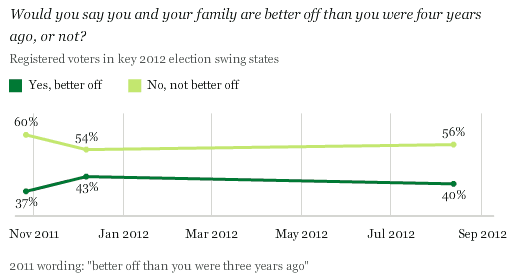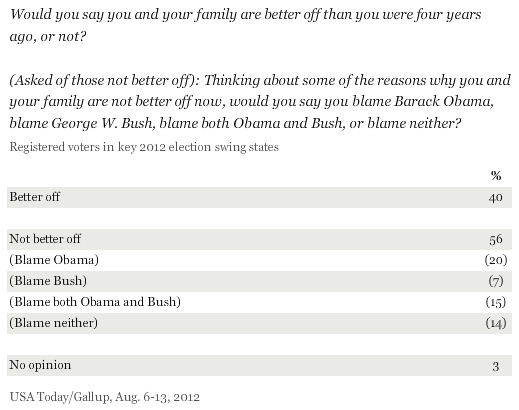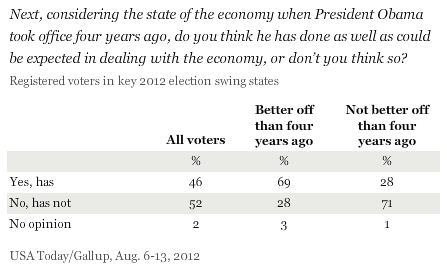PRINCETON, NJ -- A majority of voters in key 2012 election swing states say they are not better off than they were four years ago; 40% say they are better off. Swing-state voters' assessments of their situation compared with 2008 have varied little since last fall.

The results are based on the latest USA Today/Gallup Swing States poll, conducted Aug. 6-13 with a sample of 970 registered voters in Colorado, Florida, Iowa, Michigan, Nevada, New Hampshire, New Mexico, North Carolina, Ohio, Pennsylvania, Virginia, and Wisconsin.
The results are similar for all U.S. registered voters, among whom 42% say they are better off and 55% say they are not.
Presidential candidate Ronald Reagan famously asked Americans, in a 1980 presidential debate, if they were better off than four years ago. Shortly thereafter, he decisively defeated incumbent Jimmy Carter in the presidential election.
The question is relevant again in 2012 as Barack Obama seeks a second term as president with the economy still struggling to recover from the 2008-2009 recession. The fact that the majority of voters in the crucial states that will decide the election believe they are not better off is a challenge for the Obama campaign. That includes 50% of independent voters in the swing states, in addition to 36% of Democrats and 84% of Republicans saying they are not better off.
One key in determining how big a threat the lack of improvement in voters' lives is to Obama's re-election chances is whether they blame him for their situation. The poll finds that voters do not widely blame Obama for their circumstances. Twenty percent of swing-state voters say they are not better off and blame Obama alone. Another 15% are not better off and blame Obama but also blame George W. Bush. And 21% do not blame Obama, including 7% who believe Bush alone is responsible.

It is quite possible that voters may cut Obama some slack on the economy, given that he took office during one of the worst economic downturns in U.S. history. And the poll finds that is the case for just under half of voters in the swing states, with 46% saying Obama has done as well as could be expected in dealing with the economy given its condition when he took office, while 52% say he has not. The majority of those who are better off say Obama has done as well as could be expected, while most of those who say they are not better off disagree.

Still, swing-state voters are not convinced they would be better off in four years under Romney. Forty-four percent predict they would be better off four years from now if Romney wins and 49% say they would not be better off. Those figures are roughly the same when voters are asked to predict their situation in four years if Obama is re-elected -- 42% say they would be better off and 52% say they would not be.
A follow-up question asked voters to choose whether their situation would be better in four years if Obama is re-elected or if Romney is elected. Swing-state voters divide evenly, with 44% choosing Romney and 44% Obama. However, most of those who say they are not better off believe they would be better off in four years if Romney, rather than Obama, is elected.
![If you had to choose, do you think you and your family would be better off in four years -- [ROTATED: if Mitt Romney is elected president (or better off) if Barack Obama is re-elected president]? August 2012 results in swing states](http://content.gallup.com/origin/gallupinc/GallupSpaces/Production/Cms/POLL/zrcyz-d1g0agasiz37jljw.gif)
Implications
President Obama's re-election prospects remain uncertain. Gallup Daily tracking finds Romney with a slight edge over Obama in recent days. Obama fared slightly better in the Aug. 6-13 swing-state poll, with 47% of voters in those states preferring him and 44% Romney. Most of that interviewing was conducted before Romney announced Paul Ryan as his running mate on Aug. 11.
Obama would almost certainly be in a better position in the election if more voters thought their situation had improved since 2008 than currently do. At the same time, things could be worse for him. Voters who say they are not better off today do not universally blame Obama for their circumstances, and voters are divided as to whether he has done as well as could be expected in handling the economy, given the problems he inherited. Additionally, many of those who say they are not better off are Republican partisans who would likely not vote for Obama regardless of their situation.
In order to get re-elected, Obama must convince more voters that things are not as bad as they were four years ago, and that a major reason current conditions are not better is that the country had a long way to go to recover from the recession.
Survey Methods
Results for voters in 2012 Election swing states are based on telephone interviews conducted Aug. 6-13, 2012, on the Gallup Daily tracking survey, with a random sample of 970 registered voters, aged 18 and older, living in Colorado, Florida, Iowa, Michigan, Nevada, New Hampshire, New Mexico, North Carolina, Ohio, Pennsylvania, Virginia, and Wisconsin. The data represent a subset of Gallup's national daily tracking survey for those dates. The swing-state data are weighted to be demographically representative of the combined population in those 12 states.
For results based on the total sample of swing-state registered voters, one can say with 95% confidence that the maximum margin of sampling error is ±4 percentage points.
Interviews are conducted with respondents on landline telephones and cellular phones, with interviews conducted in Spanish for respondents who are primarily Spanish-speaking. Each sample includes a minimum quota of 400 cell phone respondents and 600 landline respondents per 1,000 national adults, with additional minimum quotas among landline respondents by region. Landline telephone numbers are chosen at random among listed telephone numbers. Cell phone numbers are selected using random-digit-dial methods. Landline respondents are chosen at random within each household on the basis of which member had the most recent birthday.
Samples are weighted by gender, age, race, Hispanic ethnicity, education, region, adults in the household, and phone status (cell phone only/landline only/both, cell phone mostly, and having an unlisted landline number). Demographic weighting targets are based on the March 2011 Current Population Survey figures for the aged 18 and older non-institutionalized population living in U.S. telephone households. All reported margins of sampling error include the computed design effects for weighting and sample design.
In addition to sampling error, question wording and practical difficulties in conducting surveys can introduce error or bias into the findings of public opinion polls.
View methodology, full question results, and trend data.
For more details on Gallup's polling methodology, visit www.gallup.com.
